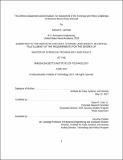| dc.contributor.advisor | Owen R. Coté, Jr. | en_US |
| dc.contributor.author | Lacinski, Samuel S | en_US |
| dc.contributor.other | Technology and Policy Program. | en_US |
| dc.date.accessioned | 2017-09-15T14:20:47Z | |
| dc.date.available | 2017-09-15T14:20:47Z | |
| dc.date.copyright | 2017 | en_US |
| dc.date.issued | 2017 | en_US |
| dc.identifier.uri | http://hdl.handle.net/1721.1/111240 | |
| dc.description | Thesis: S.M. in Technology and Policy, Massachusetts Institute of Technology, School of Engineering, Institute for Data, Systems, and Society, Technology and Policy Program, 2017. | en_US |
| dc.description | This electronic version was submitted by the student author. The certified thesis is available in the Institute Archives and Special Collections. | en_US |
| dc.description | Cataloged from student-submitted PDF version of thesis. | en_US |
| dc.description | Includes bibliographical references (pages 97-102). | en_US |
| dc.description.abstract | Technological innovation broadly is one of the major sources societal advance. In the realm of defense, it is of prime importance to the strategic interests of a nation. Defense innovation policy is the culmination of a variety of factors, including considerations of the future strategic environment, bureaucratic and organizational politics between military services and civilian agencies, and domestic politics. The differing degrees of influence of these inputs often helps to explain the resultant systems. A case study of particular interest in United States' defense innovation is the modern evolution of missile defense systems. Such evolution principally began under the Reagan administration in response to the threat from the Soviet Union and continues today to meet emerging missile threats. With the emergence of the North Korean ballistic missile threat, a new capability using unmanned aerial vehicles to intercept missiles during boost phase may increase capability to defend the United States from missile attack. To assess why such a system does not currently exist, the viability of such a system, and understand how to field such a system, the following framework is developed: 1. A historical analysis of the origins of current missile defense systems and the implications of its legacy; 2. The establishment of a policy consensus of a shift in missile defense towards North Korea and the identification of a technological opportunity in boost-phase intercept; 3. Building a political coalition to support the new boost-phase intercept system; 4. Case studies on previous missile defense efforts to develop a good product. This thesis identifies concurrency in acquisitions to provide rapid capability against emerging third-world missile threats as a prime reason for the lack of a current boost-phase intercept capability. Next, it shows that a system based on the MQ-9 Reaper could provide the capability to intercept notional intercontinental- and intermediate-range ballistic missiles from representative geographies in the near-term. Finally, it suggests a political coalition incorporating the combatant commands and the United States Navy due to operational and organizational interests to champion the development of such a system, incorporating recommendations to improve the acquisitions process. | en_US |
| dc.description.statementofresponsibility | by Samuel S. Lacinski. | en_US |
| dc.format.extent | 113 pages | en_US |
| dc.language.iso | eng | en_US |
| dc.publisher | Massachusetts Institute of Technology | en_US |
| dc.rights | MIT theses are protected by copyright. They may be viewed, downloaded, or printed from this source but further reproduction or distribution in any format is prohibited without written permission. | en_US |
| dc.rights.uri | http://dspace.mit.edu/handle/1721.1/7582 | en_US |
| dc.subject | Institute for Data, Systems, and Society. | en_US |
| dc.subject | Engineering Systems Division. | en_US |
| dc.subject | Technology and Policy Program. | en_US |
| dc.title | The Defense Department and innovation : an assessment of the technical and policy challenges of airborne boost-phase intercept | en_US |
| dc.type | Thesis | en_US |
| dc.description.degree | S.M. in Technology and Policy | en_US |
| dc.contributor.department | Massachusetts Institute of Technology. Engineering Systems Division | |
| dc.contributor.department | Massachusetts Institute of Technology. Institute for Data, Systems, and Society | |
| dc.contributor.department | Technology and Policy Program | |
| dc.identifier.oclc | 1003289776 | en_US |
